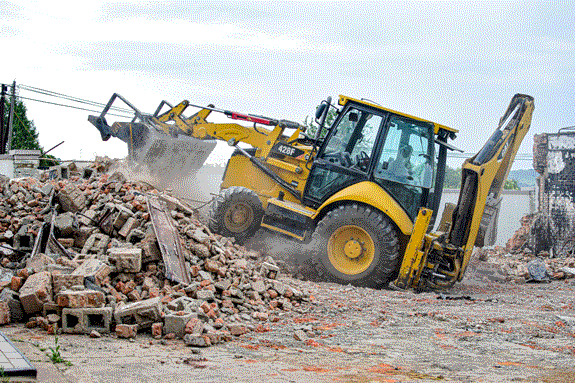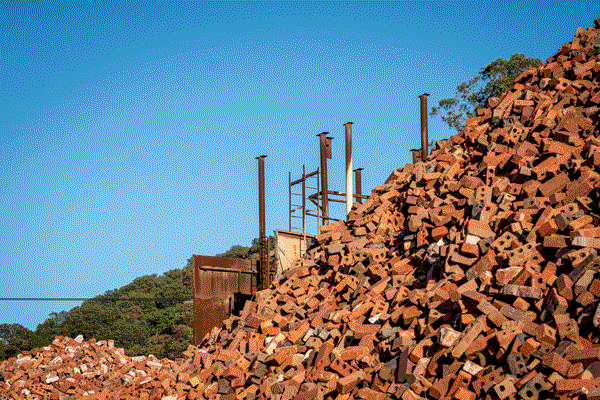5901 Botham Jean Blvd, Dallas, TX 75215
What Are Construction Waste Disposal Costs?
April 29, 2025Construction waste disposal costs include all expenses related to managing and removing debris generated during building projects, renovations, and demolitions. These costs are significant and can impact project budgets and timelines. For contractors and project managers, understanding these expenses is essential for accurate financial planning.
As of August 2024, the average cost for construction waste disposal ranges from $66.70 to $78.00 per cubic yard. This pricing reflects the specialized handling required for materials like concrete, bricks, scrap metal, and lumber. Cost variations typically depend on location, waste volume, and specific materials being disposed of.
The financial impact of waste disposal extends beyond direct removal costs. Improper waste management can lead to compliance issues, fines, and project delays. Construction and renovation projects generate substantial debris—about 30% of materials delivered to a site can become waste. Efficient disposal planning is crucial for effective project management.
How are Construction Waste Disposal Costs Calculated?

Construction waste disposal costs are primarily calculated based on the volume or weight of debris removed, differing from other construction expenses that might be estimated per square foot. The industry standard focuses on the waste generated rather than the construction area’s size.
The basic formula for calculating debris removal costs is straightforward: Removal Cost = (Volume or Weight) × Rate + Labor. Volume is typically measured in cubic yards, with one cubic yard being roughly the size of a washing machine. Weight measurements are used for heavier materials like concrete and are calculated in tons.
Several key factors influence the final cost you’ll pay for construction waste disposal:
Volume and Weight Considerations
The amount of debris generated directly impacts your disposal costs. Most removal services charge based on cubic yards for volume or tonnage for weight. Heavier materials like concrete and bricks cost more to dispose of than lighter materials like wood or drywall.
For weight-based pricing, disposal facilities charge by the ton. This method more accurately represents the true cost of waste management since landfill tipping fees are typically weight-based. Weight-based pricing provides a clearer cost signal and helps companies budget more accurately.
Volume-based pricing uses standardized container sizes. Companies often charge fixed rates for different dumpster sizes, ranging from 10 to 40 cubic yards, regardless of how dense the materials are.
Type of Waste
Different materials require different handling and disposal methods. Regular construction debris like wood, drywall, and metal generally costs less to dispose of than special materials. Hazardous materials such as asbestos or materials containing lead paint require specialized disposal methods and permits, significantly increasing costs.
Recyclable materials might cost less to dispose of or even generate returns in some cases. Metal, clean wood, and concrete can often be recycled, potentially reducing overall disposal expenses.
| Material Type | Cost per Cubic Yard | Cost per Ton |
|---|---|---|
| General Construction Debris | $66.70 – $78.00 | N/A |
| Concrete | N/A | $114.91 |
| Bricks | N/A | $114.91 |
| Metal | Recyclable – Potential Returns | N/A |
| Wood | Recyclable – Potential Returns | N/A |
| Hazardous Materials (Asbestos, Lead Paint) | Specialized Disposal Required | Specialized Disposal Required |
Project Size and Location
Larger projects typically generate more waste. While this increases total costs, you may qualify for bulk rates that reduce per-unit disposal expenses. Projects in urban areas often face higher disposal costs due to limited landfill space and stricter regulations.
Distance to disposal facilities also matters. Remote project sites require longer transportation routes, increasing fuel costs and time. Many companies add mileage surcharges when the disposal site is far from your project location.
Local regulations and disposal fees vary significantly by region. Some municipalities impose additional taxes or fees on construction waste. C&D minimum charges can range from $40 for small loads to $51 for medium loads, depending on your location.
Estimation Tools
Accurate cost estimation prevents budget overruns. Several tools can help project managers calculate disposal costs more precisely. The Construction Waste Removal Estimator Calculator lets users input project details, select waste types, and estimate volume to calculate projected disposal costs.
These calculators typically factor in project size, waste type, local disposal rates, and transportation costs. They help contractors anticipate expenses and plan accordingly. Some estimation tools also provide recycling options that may reduce overall disposal costs.
Professional waste management companies can provide detailed quotes based on your specific project requirements. They assess factors like accessibility, waste type, and local disposal options to give you accurate cost projections.
What are the Environmental and Regulatory Considerations?
Construction waste disposal poses a significant environmental challenge. In the United States, around 600 million tons of construction debris enter the waste stream annually. This immense volume strains landfill infrastructure and contributes to pollution concerns.
Effective waste management strategies offer several environmental benefits. Diverting construction materials from landfills reduces the need for new disposal sites and extends the lifespan of existing facilities. Strategic waste handling also decreases soil contamination and groundwater pollution that occur when materials decompose in uncontrolled environments.
Reducing Environmental Impact
Construction waste has significant ecological implications beyond occupying landfill space. Materials like treated wood, adhesives, and certain insulation products can release harmful compounds into soil and water systems. Responsible disposal practices are crucial to preventing these contamination pathways.
Resource conservation is another important benefit of proper construction waste management. Recycling or repurposing materials like concrete, metal, and wood reduces the demand for virgin resources, helps preserve natural habitats, and lowers the carbon footprint associated with new material production.
By implementing systematic separation and recycling protocols, construction sites can significantly reduce their environmental impact. Materials like clean wood waste can be processed into mulch or biomass fuel, while concrete and asphalt can be crushed and reused for road base materials or new construction applications.
Regulatory Compliance Requirements
The construction industry must adhere to stringent environmental regulations. Federal frameworks like the Resource Conservation and Recovery Act (RCRA) and the Comprehensive Environmental Response, Compensation, and Liability Act (CERCLA) establish baseline waste handling requirements. State and local jurisdictions often add additional rules for construction operations to follow.
Non-compliance with these regulations can lead to severe consequences, including financial penalties, project delays, and legal action. Companies in violation may face increased scrutiny on future projects, creating ongoing operational challenges.
Regulatory requirements typically address key areas of waste management, such as proper waste characterization, appropriate storage methods, transportation documentation, and final disposal verification. Many regulations also mandate specific handling procedures for hazardous materials found in construction waste.
Maintaining detailed documentation is critical for regulatory compliance. Construction sites must keep comprehensive records of waste generation, handling procedures, and final disposal locations. These records serve as evidence of compliance during inspections and demonstrate environmental responsibility.
Financial Benefits of Compliance
While regulatory compliance might initially seem burdensome, it often provides significant long-term cost advantages. Companies with robust waste management systems avoid costly fines and penalties and reduce their potential liability for future environmental remediation costs.
Efficient waste management can lead to direct operational savings. By separating recyclable materials and finding alternative uses for waste products, companies can significantly reduce disposal costs. Many regions charge premium rates for landfill disposal, making waste reduction a financially sound strategy.
Companies with strong environmental compliance records often gain a competitive edge when bidding for projects. Many clients prioritize environmental responsibility in their contractor selection process. A documented history of regulatory compliance can help secure valuable contracts, especially for publicly funded or high-profile construction projects.
Investing in proper waste management systems typically yields strong returns through reduced disposal costs, avoided penalties, and enhanced business opportunities. Viewed holistically, environmental compliance is both an ethical obligation and a sound business strategy for construction operations.
| Waste Management Strategy | Annual Waste Treated (tons) | CO2 Emissions Prevented (tons) | Additional Benefits |
| Waste-to-Energy (Meath, Ireland) | 234,660 | 128,427 (biogenic) | Generates 18MW electricity, metals recovery |
| Anaerobic Digestion (Green Era, Illinois) | 80,000 | 42,500 | Supports urban farming, community education |
Conclusion: Maximizing Savings Through Effective Waste Management

Effective construction waste management extends beyond environmental responsibility, offering substantial financial benefits to construction companies. By implementing strategic practices like on-site recycling and source separation, projects can significantly reduce disposal costs and minimize material expenses. Companies with comprehensive waste management plans consistently report lower project expenses and improved profit margins.
The combined environmental and financial benefits make waste management optimization essential in the construction industry. From careful material ordering to exploring innovative recycling technologies, construction companies have numerous opportunities to reduce waste and maximize resource efficiency. These practices not only lead to immediate cost savings but also position companies as responsible industry leaders.
For expert guidance on effective recycling strategies for your construction projects, contact Okon Recycling at 214-717-4083.
